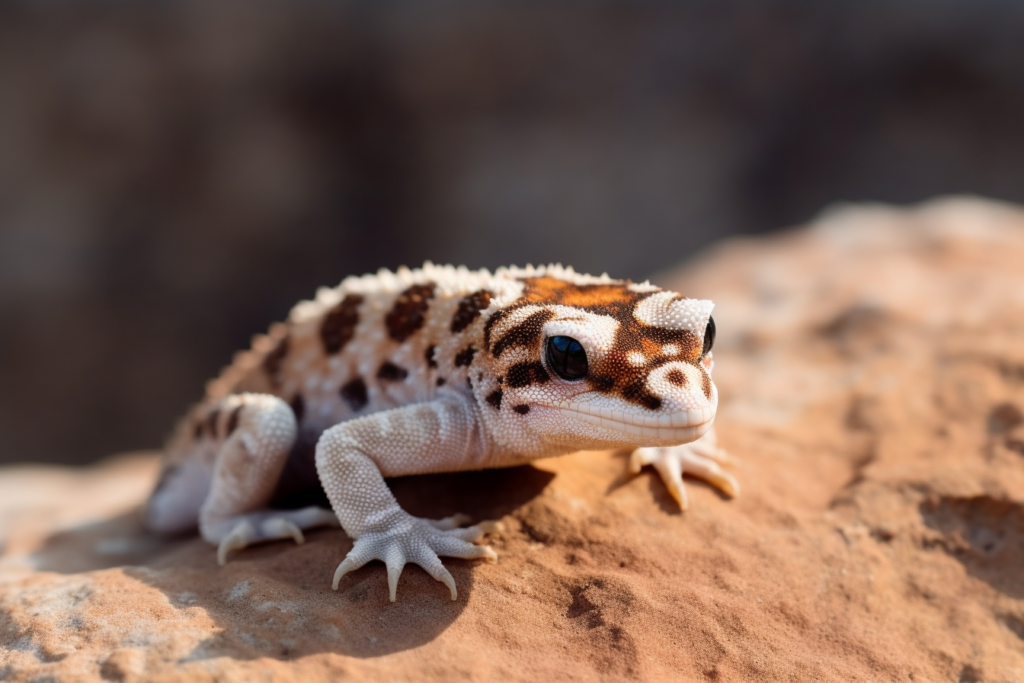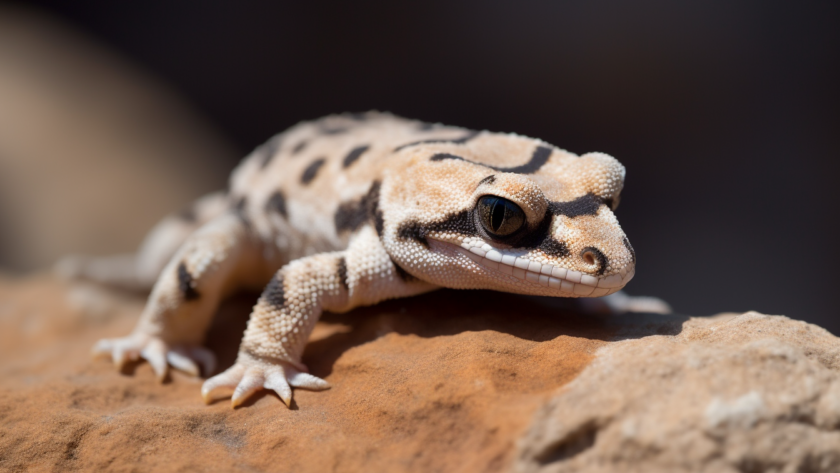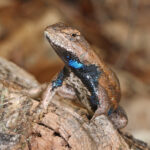Are you curious about the African Fat Tailed Gecko lifespan?
It’s important to know what to expect before bringing one into your home.
These fascinating lizards can make great companions, but it’s essential to understand their needs in order to keep them healthy and happy.
In this article, we’ll explore the lifespan of African Fat Tailed Geckos, as well as other considerations like health care requirements and housing needs.
We’ll also cover common health issues and how to care for an older gecko.
With the right knowledge and care, you can provide a loving home for your new friend!
Table of Contents
Overview of African Fat Tailed Geckos

You might not know this, but these unique reptiles have some fascinating characteristics that make them stand out from other species.
African Fat-Tailed Geckos are a type of small lizard native to West Africa and have become popular among reptile enthusiasts due to their docile nature and striking appearance.
They are typically nocturnal in the wild, meaning they spend the majority of their time in dark crevices or camouflaged within leaf litter during daylight hours.
They mainly feed on insects such as crickets and mealworms; however, they can also benefit from a diet supplemented with calcium dusting to ensure they receive all necessary nutrients for healthy growth.
In terms of breeding habits, male geckos will often display territorial behavior towards one another if kept together for extended periods of time.
It’s best to separate males until mating season begins if you plan on keeping more than one gecko at a time.
African Fat Tailed Gecko Lifespan
The lifespan of these reptiles range from 5-10yrs, so it’s wise to be prepared for a long commitment!
African Fat Tailed Geckos are an interesting addition to any home, and there are some important things to know about their care, including:
Dietary needs – These geckos require a balanced diet of live insects such as crickets and mealworms.
Temperature Range – It is important to maintain the right temperature in their habitat. This should be between 75°F and 80°F during the day with a basking spot reaching up to 88°F; at night, temperatures should drop between 68°F and 78°F.
Humidity – The cage should have an ambient humidity level of 65%-75%.
Enrichment – Providing your African Fat Tail Gecko with plenty of hiding spots will keep them feeling secure and provide enrichment opportunities.
Owning one of these fascinating animals can be very rewarding, but you must also remember that they can live for several years.
Taking good care of your African Fat Tail Gecko will ensure that they remain healthy and happy for many years to come!
Health Considerations
It’s important to be mindful of your African Fat Tailed Gecko’s health, so you’ll want to make sure you’re up-to-date on the latest advancements in reptile care.
Just like any other pet, providing your gecko with a balanced diet is paramount for their wellbeing and longevity. This means providing them with a variety of nutritious insects, such as crickets, mealworms, waxworms, and superworms. Supplementing their diets with calcium powder and vitamins can also help ensure they are getting all the necessary nutrients they need.
In addition to dietary needs, it’s also important to provide your African Fat Tailed Gecko with routine veterinary care from an experienced herp vet. This includes check-ups every 6 months or so to monitor their overall health and development. Regular visits will also allow you to address any potential issues before they become too serious.
Additionally, if your gecko ever experiences any kind of injury or illness it’s best to consult a vet who is knowledgeable about reptiles right away for proper diagnosis and treatment.
African Fat Tailed Gecko Lifespan: Housing Requirements
To house your gecko, you’ll need a terrarium with plenty of space to roam and climb. African fat-tailed geckos require an enclosure that is at least 20 gallons in size and has adequate climbing surfaces, as they can be quite active.
For two adults or four juveniles, the enclosure should be larger than 25 gallons. It’s important to provide multiple hiding places and secure furnishings within the enclosure so your gecko can feel safe and comfortable.
In terms of temperature needs, African fat-tailed geckos prefer a warm environment between 75℉ (24°C) and 85℉ (29°C). You’ll need to create a thermal gradient by providing both hot and cooler spots in the enclosure for your gecko to regulate their body temperature.
Additionally, it’s important to keep humidity levels between 40% – 60%, which can be achieved through daily misting or by using humidity hides filled with damp moss or substrate.
With proper care, these enclosures can help ensure an African fat-tailed gecko lives a long life full of health and happiness!
Handling and Interaction
Gently handling your gecko and interacting with it regularly can create a bond that will last its lifetime! African Fat-tailed Geckos are relatively docile, so they’re suitable for gentle handling.
The key is to ensure you don’t cause the gecko any stress or discomfort when holding it. Remember to always support their body weight and avoid restraining them in tight places or grasping too firmly.
Some tips on proper handling techniques include using two hands (one hand supporting its body and the other lightly cupping its head), gently scooping up your gecko from below, and being aware of how much grip pressure you place on them while held.
Socializing your pet gecko is also important for a lasting bond between you two. When done properly, socializing can help reduce stress levels for both you and your pet while increasing trust between the two of you.
Tips for successful socializing include spending time around your gecko daily, offering treats such as mealworms or wax worms, speaking softly near them during interactions, avoiding sudden movements when around them, and allowing them to come to you instead of chasing after them during playtime.
With patience and consistency in practice comes true companionship with your pet!
Common Health Issues
You’ll want to be aware of any common health issues that may affect your pet gecko so you can take the necessary steps to keep them healthy and happy!
African fat-tailed geckos are hardy reptiles, but they can still suffer from some common health issues.
Dietary needs are important for this species; they require a diet rich in calcium and vitamin D3. You should also make sure that their food is properly balanced with insects, fruits, vegetables, and vitamins. A lack of these essential nutrients can lead to metabolic bone disease or other health problems.
Temperature control is also key when it comes to keeping your pet gecko healthy. African fat-tailed geckos do best at temperatures between 78°F-82°F during the day and 68°F-72°F at night.
If temperatures drop too low or become too hot, it can cause stress on your gecko which could lead to illness or death if not rectified quickly. Make sure you provide the correct temperature range for your pet’s enclosure as well as appropriate hiding spots for them to regulate their own body temperature if needed.
Caring for an Older Gecko
As your pet ages, it’s important to keep an eye on their care needs to ensure they stay healthy and happy for the duration of their life.
When caring for an older African Fat-Tailed Gecko, there are a few things to consider:
-
Exercise Needs – As geckos age, they tend to become less active and may need help getting exercise. Be sure to provide them with plenty of climbing opportunities in their enclosure so that they can remain agile as long as possible.
-
Dietary Changes – It’s recommended that you slowly transition your gecko’s diet from insects and worms when they are younger to a diet primarily composed of fruits, vegetables, and other plant matter as they age. This will help ensure that they receive all the necessary nutrients throughout their life.
-
Enclosure Upkeep – Make sure you keep the enclosure clean by regularly removing any waste or uneaten food and changing out dirty substrate (if applicable). Additionally, be sure to check the humidity levels in the enclosure often since this can affect your gecko’s health if too low or too high.
-
Veterinary Care – Regular checkups with a qualified reptile vet should be done to make sure your pet is in good health at all stages of its life cycle; this is especially important for elderly pets who may require additional attention or treatments due to age-related issues or illnesses that could arise over time.
Overall, proper care during old age is essential for keeping your African Fat-Tailed Gecko healthy and happy for years to come! With regular monitoring of dietary needs, exercise habits, enclosure upkeep, and veterinary visits, you can rest assured knowing that he/she will live out its full lifespan with minimal issues along the way!
Frequently Asked Questions
What is the average size of an African Fat Tailed Gecko?
You’ll be amazed by the size of an African Fat Tailed Gecko! This incredible creature can reach lengths of up to 10 inches, with their tails accounting for half that length.
In order to keep your pet healthy and happy, it’s important to provide them with a diet rich in insects and the right housing requirements. They need plenty of space and humidity, as well as a warm basking area.
With proper care, your gecko can live up to 15 years – an eternity compared to other reptiles!
What type of food do they usually eat?
When it comes to feeding habits, African Fat Tailed Geckos typically eat insects, such as crickets, mealworms, and wax worms. They also enjoy fruits and vegetables like apples and carrots.
To ensure your gecko is getting all the necessary nutrients, you should provide them with a variety of food items that are finely chopped or mashed up. Be sure to avoid any foods that are too salty or sweet, as these could make your gecko ill.
With proper diet requirements and regular feedings, you can ensure that your African Fat Tailed Gecko will have a happy and healthy life!
Are African Fat Tailed Geckos good for beginner reptile owners?
You’re considering an African Fat Tailed Gecko as your first reptile pet, and you want to know if they’re a good choice for beginners?
The short answer is yes! With proper handling tips and temperature requirements, these reptiles make excellent pets.
To illustrate their suitability, consider this analogy: owning an African Fat Tailed Gecko is like taking the first step of a marathon run—it requires perseverance and dedication, but it’s doable.
Plus, their personality traits ensure that the journey will be enjoyable every step of the way!
Are African Fat Tailed Geckos typically aggressive?
When it comes to the temperament of African Fat Tailed Geckos, there are a few handling techniques that can help you determine whether they will be aggressive or not. Generally speaking, these geckos are non-aggressive and don’t typically display any type of behavior issues.
However, if you do notice any signs of aggression such as hissing, lunging or biting, then it’s best to remove the gecko from its environment and practice more gentle handling techniques to ensure the safety of both yourself and the gecko.
With proper care and attention, your African Fat Tailed Gecko should live a happy, healthy life for many years!
How often should African Fat Tailed Geckos be handled?
African fat-tailed geckos can live up to 15 years, so it’s important to understand how best to handle them.
Generally speaking, you should handle them no more than once a week and for brief periods of time. This is especially true if the enclosure size is small, as too much handling can cause stress on the animal.
Handling frequency also depends on the individual gecko; some may be more comfortable with frequent handling while others prefer less contact.
In either case, it’s important to provide ample space and hideouts in their enclosure so they feel secure when not being handled.
Conclusion
You’ve learned a lot about African Fat Tailed Geckos and their lifespans. These fascinating reptiles can live up to 15 years when taken care of properly, with some living even longer.
It’s important to provide them with the right habitat and diet so they stay healthy and happy throughout their lives. Additionally, regular handling and interaction is key for keeping them content.
With proper care, you can expect your gecko to be a beloved pet for many years to come! Interesting fact: The average lifespan of an African Fat Tailed Gecko in captivity is approximately 10-15 years, compared to just 1-2 years in the wild.




